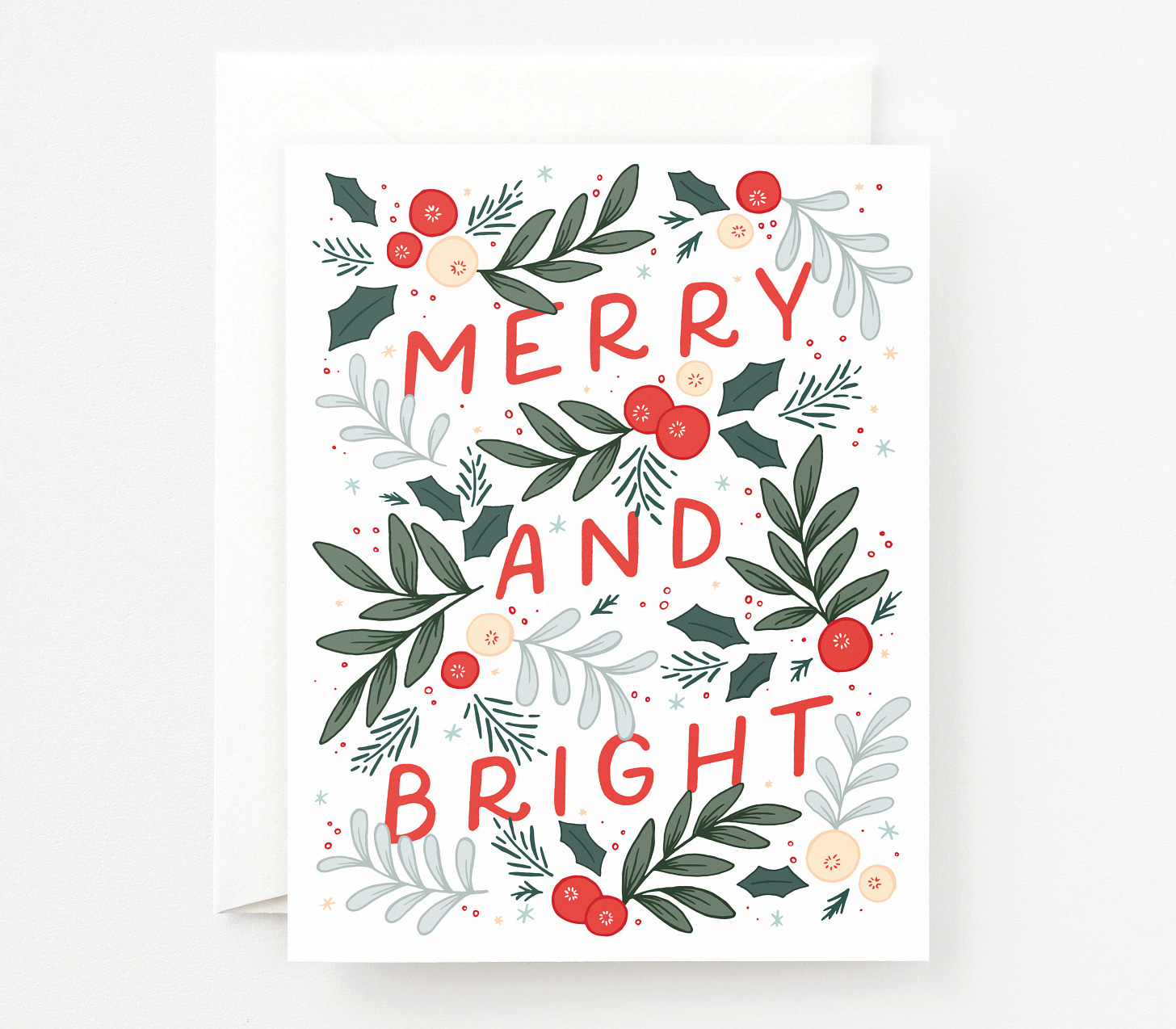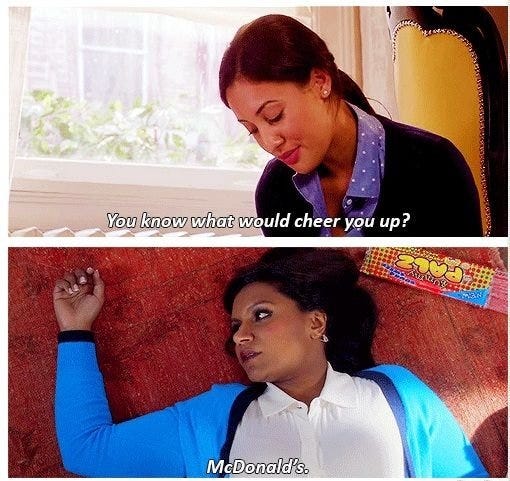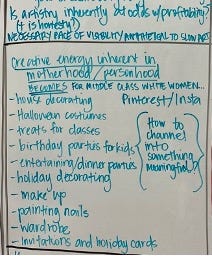Accepting of Whatever Actually Is
You can just order your holiday cards like normal people; I’ll be over here overthinking.
Note: If you’re tempted to skip the many asides in this post, know that the footnotes might be essential for making sense of this one. Just click through the post (to Substack) and then click on the tiny numbers—it’s fun!
I love holiday cards.1

Last week, using an iPhone photo2 I had shot in our front yard ten minutes prior, I worked up a draft of our holiday card. Like any clever mother, I used the postponement of homework and promise of candy corn as an incentive, and the photography was remarkably tear free. Then I sat on our front porch and tinkered with a card design on my laptop while the kids beat each other up in the grass.
On the back of the card, I typed up a little note about our family’s life in 2022. Per my tradition of at least six years, the note didn’t read like other Christmas cards. (The year our twins were born, I included a tally of diapers changed and PBJs made, and I confessed that I had wrecked both my car and my husband’s in the space of three months.) Again this year, in a space Minted.com suggests we fill with #humblebrags, I ditched the template and wrote something a little more… authentic. In my mind, I crafted a message that was both honest and joyful, a reflection that I hoped encompassed my beliefs about the entire universe in 200-words-or-less.
That evening, before we sank into the sofa to watch television, I asked Husband to read it. He was so tired and it was a bit unfair of me, but such is my holiday card delight that I could not wait another day.
“I think it’s fine,” he said in a voice flatter than I preferred.
I pressed him. “What? Is it bad?”
“It’s not bad. It’s just not like other people’s Christmas cards.”
Here is where I would like to insert a slightly-askew laughing face emoji to emphasize my ridiculousness. He was 100% right, and I knew he was right, and this kind of made me spiral.3 What I heard as apprehension was, really, apathy. (He later clarified: “Lindsey, I am criticizing neither your existence in the universe nor your worldview. I just do. not. care.”)
So eventually we pressed play on The Mindy Project (intense television is not for me these days), surrendering to our exhaustion and shelving both the conversation and the task of ordering the holiday cards.
But the whole thing kept bugging me. Listen, the urge to represent oneself (and one’s family) in a perfect light is as old as time. People have been sending “life is awesome and everything is great!” holiday cards since at least 1843, when the tradition was allegedly begun in England by Sir Henry Cole.
As proof of this firmly ensconced Western tradition, here’s some suggested copy lifted directly from the Minted website:
What a momentous year! From soccer practice and swim meets in full swing again to our national park road trip in the summer (the family fave: Big Bend National Park in Texas!), we have loved spending more time together as a family. We’ve been wonderfully blessed this year and send you warm wishes for a joyful holiday season.
I won’t paste more examples, but they read as though the higher-ups at Minted instructed their poor intern copywriter to use the word blessed “at least once” in each example.
There is nothing wrong with this. I think people’s need to lean into the good is often, well, good.
These kinds of notes are just not for me. I think life is hard, universally. I think this because of my own life, but also because right this moment I am sitting in a coffee shop in South Carolina, and the woman at the table next to me is full-on weeping. I can’t hear what she is saying (and am not trying to) because my AirPods are in, but I can see peripherally that her friend’s hand rests gently on top of hers, that she wipes profuse tears with the other hand, that her head is hung low beneath her baseball cap.
Okay, this is anecdotal. One happenstance used to strengthen the point I was already making. But also: I sit with my own weeping friends, and I cry to them, too: for their failures, for mine, for others’. For disappointments and losses and overwhelm and blunt realizations. For things little and big, passing and permanent. Or I muscle through, which is sometimes just as difficult.
I also believe admitting “life is hard” makes other people feel less alone, and making other people feel less alone is a high value of mine. This is just the writer in me, the part of me that exhilarates and exasperates those around me in roughly equal measure.4
Here is something Anne Lamott said about writers:
We are a species that needs and wants to understand who we are. Sheep lice do not seem to share this longing, which is one reason why they write so little.
How can we understand who we are if we don’t tell the truth? How can we tell the truth if we don’t at least sprinkle in the hard stuff?
While all this was rattling around in my skull, I caught up on George Saunders’ Story Club. (Like the newsletters of Nick Cave and Anna Sproul-Latimer and Katheryn-Jezer Morton and the podcasts of Krista Tippet, this one is a guiding light for me.) Anyway, it’s a newsletter about writing, and he said this:
To my mind, all stories are about triumph. It might just be a question of scale, and of how we define “triumph.” If I am walking along the street in my new suit, holding an expensive vase, and slip and fall into the mud and the vase breaks – that’s just the set-up. That doesn’t say that life always sucks, but just that it sometimes can suck. It says something about the world (“It’s rough down here, brother”), but what happens next? That’s the meaning of the story.
The best stories, which are the best because they reflect truth, manage to entwine both the difficulty of reality and the ultimate triumph. They admit that some things suck, but “that’s just the set-up.” They also make what I often refer to when teaching as “a turn,” a subtle thing that is actually wildly subversive—a movement toward unexpected hope and grace.
I had all that business in my head when I asked my husband to read the card message. Here is the original draft of it.
What a year. We built a house, we moved, we took on new jobs, we got in over our heads in every way imaginable. It was exhausting, TBH.
But these four right here?
They light up the world.
Lennon loves justice and baking shows, Poppy loves cracking jokes and wants to marry Bob Ross (may he rest in peace), Wilder is super intense both in his feelings and on the soccer field, and Scout takes care of us all (especially our/her dog Bear). We are really lucky to be surrounded by so much joy.
We hope you are finding lots of joy in the chaos, too.
The hard stuff is just three sentences out of eight. It’s pretty benign, really—“just the set-up.” In those three sentences I do not claim the world is ending or imply that we aren’t privileged (#blessed) beyond measure. The inclusion of those sentences is meant to be a little nod to a fact we all know but rarely admit: life is hard. Those sentences are a teeny, tiny subversion of the norm, and including them (or some version of them) feels important to me in terms of making the world more hospitable. This is what I was trying to say:
It’s rough down here, brother. We lose our keys and our patience. We forget to sign homework folders and fill out reading logs. We leave packed lunches in lunchboxes until they turn green and hairy. We argue, we cry, we are stubborn in our wants and blind to our faults. We overcommit and fail and fail and fail. People we love and people we don’t even know struggle and suffer and die.
But what happens next? These four lights, and the delight they bring. The six-year-old-with-missing-front-teeth announcing at the dinner table that she wants to marry Bob Ross (“Bob Woss”) because his show is inexplicably, interminably broadcast every time we turn on our smartTV and she LOVES it. The other six-year-old’s obsession with the new-to-him concept of pranking even though he’s comically bad at it. The delight of living, for the first time this year, smack in the middle of an orange forest during the month of October. Chocolate-covered, frozen raspberries and the music of Joy Oladokun and LLBean slippers and Celeste Ng’s latest novel and a new smoothie blender that looks pretty sitting on the countertop. Life’s a little rough (if you ask us), but it’s also really, really good.
I concede that 97% of our holiday card recipients will be neither moved or impressed by this kind of message. I concede my husband’s point, which was that there are times and places for this kind of honesty, and holiday cards may not (or may!) be one of them.
But that 3% of card recipients who are made to feel less alone when they tear open the first card that rejects the cultural narrative of ease and unending forward progress? That’s kind of my whole thing.
George Saunders, one more time:
We all know, from experience, that life is a beautiful thing, an amazing gift. We also know that this gift can sometimes explode in our hands – the mind can go bad, circumstances can pile up against us, the body can betray us, and so on. So, stories – especially the trail of stories we leave behind us – might want to represent this complex truth…
I love the idea of trying to be neither optimistic or pessimistic in my work, but just…truthful, present, celebratory, accepting of whatever actually is, even if that requires me to set aside or expand my belief system.
I have a whole theory (only mapped out on my office dry erase board) that our modern tendency toward commodification has co-opted female creativity, such that we funnel our abundant creative resources toward class parties and holiday decorations and Instagram reels instead of more meaningful things (“Beauty will save the world,” says Dostoyevsky, and I would add: “if Instagram doesn’t get it first.”) I do this more than anyone, but it still depresses me.
I started thinking this back in the early covid times when I inexplicably began painting my fingernails. The brain space I’d usually devote to writing was all scrambled, and eventually I noticed a link between my inability to create real art and a sudden urge to give myself home manicures. Over the next two years I bought two dozen vibrant colors of fingernail polish and manicured my own fingers every Sunday night in some kind of weird, grandmothery grooming ritual. It was highly-controlled, risk-free creativity, and I loved and needed it at the time. (Now I just can’t stop the habit. The nails are currently a nice, autumnal green.)
This is not to say the card was not highly stylized. By far the best part of sending holiday cards is designing them, and gritty is sort of my aesthetic, except when it’s not.
True to enneagram 4 form, among the greatest tension of my life is a desire to both be authentic to my own experience and to “be like everyone else.” I want to “be like everyone else” an amount exactly equal to the amount I want to rattle everyone to their very bones. It’s super confusing inside my head.
Once, I met with the headmaster at my kids’ school to discuss the twins personalities as they first entered the school (every parent has to do this). He phrased it this way: “Tell me your kids’ biggest challenge and I’ll tell you their superpower.” In other words, whatever we’re great at tends to usher in our life’s greatest challenges.







Many mornings I want to cry a little and usually I can't quite figure out why, other than that the world is kind of a mess and life is hard, even though for me, it's monumentally easier than for many. If I release my tears, I can move on with my day, but sometimes I can't get the tears to come. Today, after reading this, I'm wiping my eyes. And now I can move forward. Thank you, Lindsey--I feel seen.
Okay, first, I love your whiteboard brainstorms and I want to read the whole essay on how women’s creative energy gets sublimated into the domestic (also a chronic nail painter myself, and a collector of embroidered vintage linens which speak to this in another century). And second, I adore your approach to Christmas card writing, and think it’s so important to keep both elements there. Isn’t it everyone’s first impulse upon reading one of those hyper-positive newsletters to throw it in the recycling immediately? Just me?